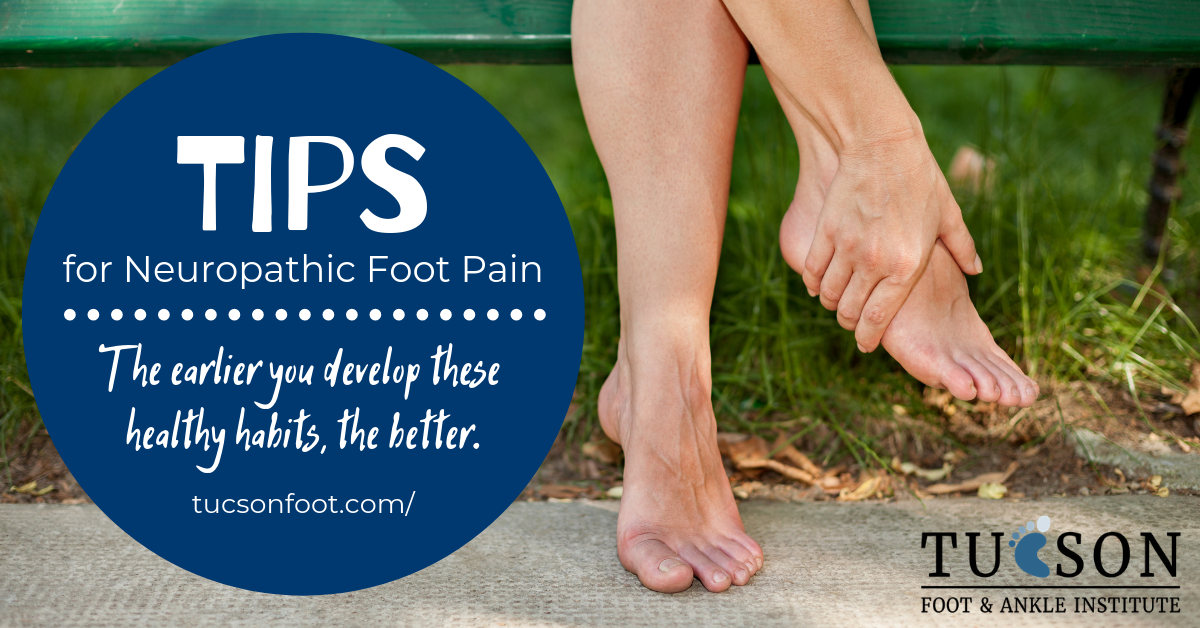Tips For Neuropathic Foot Pain
Peripheral neuropathy is a chronic, progressive condition that affects millions of Americans.
In fact, according to the Cleveland Clinic, almost 1 in 3 Americans will develop neuropathic pain at some point in their lives, including 2 out of every 3 people with diabetes.
That’s a lot of people!
Yet despite the condition reaching epidemic proportions, many people still aren’t very familiar with the best ways to manage their peripheral neuropathy—including tips to help them reduce neuropathic pain and even slow the rate at which the disease progresses.
(In many cases, that’s because they don’t seek help until long after the symptoms become noticeable and start interfering with their day-to-day lives.)
The truth is, though, that you actually do have a lot of power to reduce your pain, cope with your condition, and continue to live a full, healthy, active life—and the earlier you develop these healthy habits, the better.
Here are some of the best ways to prevent, manage, and mitigate your neuropathic foot pain.
Dietary Deficiencies
Just like any other organ, tissue, or system in your body, your nerves need the right kinds and amount of nutrients in order to perform their best. Deprive them of those nutrients, and they begin to break down and misfire.
In particular, omega-3 fatty acids and B vitamins are especially critical for nerve health. This includes thiamine (B1), niacin (B3), B6, folate (B9) and B12. Other important nutrients used by the nervous system include calcium, magnesium, and Vitamin E.
Alcohol Abuse
Over-imbibing alcoholic drinks can adversely affect your nerve health, especially if you consistently struggle with alcoholism.
For starters, in indirect terms, people who are alcoholics are also much more likely to consume a poor diet. So you may not be getting enough of those essential nutrients to nourish your nerves in the first place.
But alcohol abuse can also cause more permanent and direct damage to your nerves, too. Alcohol metabolizes extremely quickly and can penetrate the neurons in minutes, blocking neurotransmitters from performing their normal functions. Over time, this can lead to permanent damage to the nerve tissues.
Furthermore, when you drink, your body needs to expend those same essential nutrients to purge alcohol from the body—B vitamins, for example, quickly deplete when you drink. That means there are fewer nutrients left over for your nerves.
Eat a Healthy Diet
As they say, what you put into your body greatly determines what you get out of it.
A healthy diet isn’t just important for maintaining a specific waistline or preventing heart disease. Your nerves need good nutrition in order to function their best, too! Eating a balanced diet with lots of fresh fruits, vegetables, and whole grains—along with healthy sources of fat and protein—is one of the best things you can do to minimize your neuropathic pain and nourish your nerves.
Some of the most critical nutrients for nerve health include Omega-3 fatty acids, calcium, magnesium, Vitamin E, and B vitamins.
Avoid Vices
This, of course, includes unhealthy eating, like tons of sugar and fried food, which will definitely make your neuropathic pain worse.
It’s also really important to quit smoking, if you do smoke. In addition to all the other health problems posed by cigarettes and nicotine, they also can impair healthy circulation to your feet. That means less oxygen and nutrition get to your peripheral nerves. Eventually, the nerves start to degrade, leading to pain and numbness.
Limit your alcohol intake as well. Drinking once in a while in moderation is generally fine, but alcohol abuse is also linked to poor circulation, as well as dietary deficiencies that affect nerve health. Essentially, the energy and nutrients your body has to expend metabolizing the alcohol reduces its ability to nourish other parts of the body, including the nerves.
Get Regular Exercise—Safely
Exercise provides many crucial benefits for your feet and nerves, and is an irreplaceable component of a healthy lifestyle.
Regular exercise not only gets the blood flowing to your feet (and supplying your nerves with a rich amount of oxygen and nutrients), but it also provides anti-inflammatory and analgesic (pain-relieving) effects.
There’s a catch, though. If your neuropathy is severe—to the point where you experience partial or even complete numbness or “pins and needles” sensations in your feet—vigorous exercise also comes with danger. If you can’t feel your feet, how will you know if you’ve suffered an injury? Or how will you be able to keep your balance?
Fortunately, you can still find ways to get good exercise. You just have to do it safely. What that looks like depends on the severity of your condition, but low-impact cardio (brisk walking, swimming, cycling), stretching, and strengthening exercises tend to be great options. Do check with a doctor first before starting an exercise program, however.
For more info, check out our blog on exercising with neuropathy.
Maintain a Secure Environment
Most of the suggestions on this list are about ways you can take care of your body. But another great strategy is to take care your space, too.
Neuropathy and neuropathic pain can increase your risk of accidents (trips, falls, puncture wounds, etc.), and a disorganized, cluttered, or simply non-optimal living space can significantly increase the risk of these painful accidents occurring.
At a minimum, you should endeavor to keep all your walkways clear and remove potential obstacles, such as low furniture, tangled cords, etc. as much as possible. Try to put commonly used items within closer reach, too, so you don’t have to put your feet in precarious positions (stretching, bending, tiptoeing) to access them.
Depending on your situation, you may also consider things like installing grab bars in your bathrooms or even moving your bedroom to the main floor to cut down on trips up and down the stairs.
We’ve written more extensively about designing safe spaces for neuropathy in a previous blog as well, so check that out too if you’re interested in learning more.
Protect and Inspect Your Feet Daily
Neuropathy can be painful enough for your feet on its own. You certainly don’t need to be dealing with blisters, corns, or even ulcers that won’t heal (and might even get infected, or even lead to an amputation) as well!
It’s important to keep your feet properly protected by wearing a supportive pair of shoes and socks at all times—even at home. If necessary, we can also prescribe a pair of custom orthotics and/or diabetic shoes for added protection. Diabetic shoes have been shown to reduce the risk of ulceration substantially when worn regularly.
Furthermore, since you can’t always rely on your damaged nerves to report an injury to your brain, make sure you take at least a few minutes per day to carefully examine the condition of your feet. Check for blisters, cuts, toenail issues—anything out of the ordinary. Problems should be addressed immediately and, if they don’t improve, you should call us to schedule an appointment as soon as possible.
Schedule a Checkup with Tucson Foot & Ankle Institute
We already mentioned it before, but it bears repeating: if you start noticing unexplained tingling, pain, or other odd sensations in your feet that could be neuropathy, do not wait for pain to become extreme before you do something.
Even in just the last few years, our ability to manage, treat, and even reverse peripheral neuropathy has improved significantly. And our practice has remained on the cutting-edge, with advanced treatment options like radiofrequency nerve ablation, laser therapy, and decompression surgery.
We’ve even been able to help those who have been suffering for years (and seen many other doctors) relieve their symptoms to the point where they can return to their previous lifestyles.
But as with any chronic condition, the sooner you take action, the better your odds for making a dramatic recovery.
Take that important first step by calling the Tucson Foot & Ankle Institute today at (520) 545-0202.
Don’t Wait to Ask for Help!
No matter how far along you are on the path of diabetic foot complications, we can help you. But in severe cases, the existing damage is not always completely reversible. And the longer you wait, the greater your risk of an injury, wound, or infection that leads to a catastrophic change in your quality of life. So don’t wait until it’s too late! The earlier you see us, the better we can help you. To schedule an appointment with Dr. Shih, please call (520) 545-5717 today.Contact Us
Office Hours:
Monday - Friday
8:00AM - 5:00PM
Tucson Foot & Ankle Institute:
7406 N. La Cholla Blvd.
Tucson, AZ 85741
Phone: (520) 545-0202
Fax: (520) 545-0201
© Tucson Foot and Ankle Institute. All Rights Reserved. | Privacy Policy



